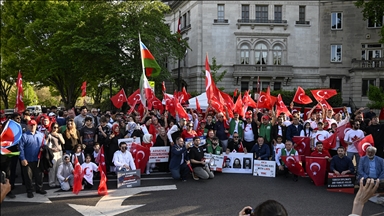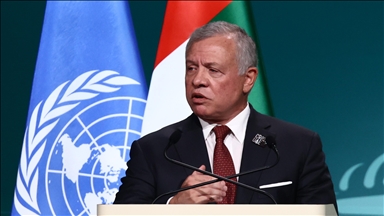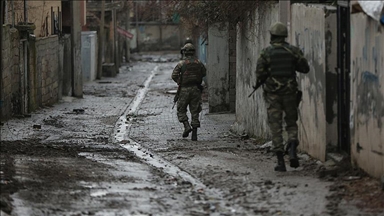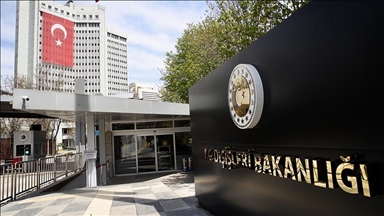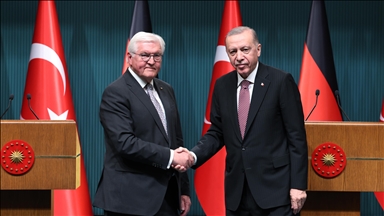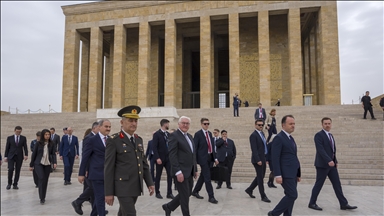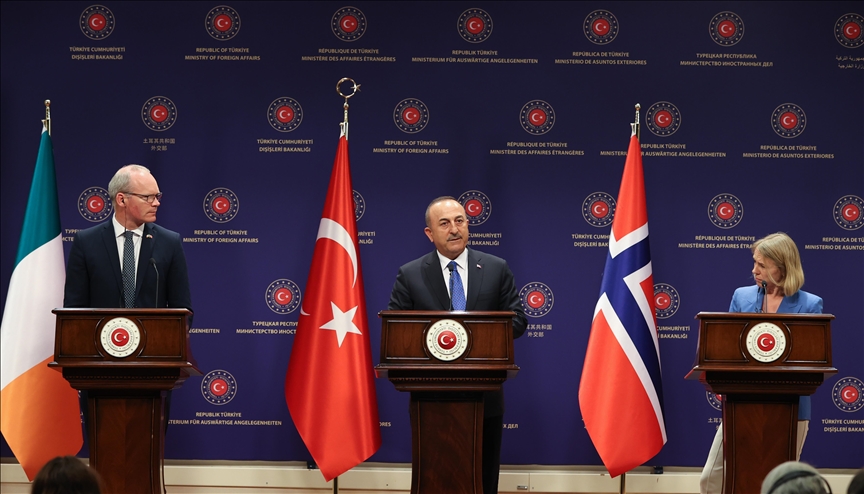
ANKARA
The documents Sweden and Finland sent to Türkiye regarding their NATO bids do not meet our expectations and our concerns need to be addressed, the Turkish foreign minister said on Wednesday.
Mevlut Cavusoglu's remarks came at a joint news conference with his Norwegian and Irish counterparts following meetings in the Turkish capital Ankara.
Besides the Nordic bids to enter the 30-nation alliance, the ministers also exchanged views on bilateral ties, the war in Ukraine and humanitarian situation in northern Syria.
The top Turkish diplomat said Finland and Sweden's responses did not address Turkish concerns, and Ankara has briefed both Stockholm and Helsinki, and NATO about the shortcomings.
"We are one of the strongest supporters of the open-door policy of NATO," Cavusoglu said, stressing that Ankara was aware of the "legitimate concerns" of both Sweden and Finland that prompted their intentions to join NATO.
On the other hand, the Turkish minister went on to note that it was vital that all three countries put some effort into understanding and supporting each other, underlining that one of the problems was the restrictions that the other two imposed on Türkiye's defense industry.
"These (restrictions) must be lifted as well, this is an expectation of ours." Cavusoglu also noted that these issues needed to be resolved through talks, not sanctions of any sort.
Sweden and Finland formally applied to join NATO on May 18, a decision spurred by Russia's war on Ukraine, which began on Feb. 24.
But Türkiye, a longstanding member of the alliance, has voiced objections to their membership bids, criticizing the countries for tolerating and even supporting terrorist groups such as the PKK and the Fetullah Terrorist Organization (FETO).
Their accession requires the unanimous approval of all 30 NATO member countries.
In late May, Türkiye hosted consultations with Swedish and Finnish delegations on their NATO applications in the capital Ankara. Turkish President Recep Tayyip Erdogan said the talks had not been "at the desired level."
In its more than 35-year terror campaign against Türkiye, the PKK -- listed as a terrorist organization by Türkiye, the US, and EU -- has been responsible for the deaths of over 40,000 people, including women, children, and infants.
FETO and its US-based leader Fetullah Gulen orchestrated the defeated coup of July 15, 2016 in Türkiye, in which 251 people were killed and 2,734 injured.
The Turkish government accuses FETO of being behind a long-running campaign to overthrow the state through the infiltration of Turkish institutions, particularly the military, police, and judiciary.
Grain exports from Ukraine
Another matter that the top Turkish diplomat commented on was a UN plan to allow grain exports out of Ukraine since the eruption of war with Russia.
The foreign minister expressed Ankara's support for the initiative, saying that it would help its legitimacy to be conducted under the banner of the UN.
The plan should not be unilateral or bilateral, but instead include both conflicting parties, as well as Türkiye and the UN, Cavusoglu said, adding that the concerns of all parties should be addressed for a productive outcome.
While Moscow fears that such a plan could serve as an entryway for arms to Ukraine, Kyiv is concerned that Russia might take advantage of the situation to strike Ukrainian ports via the corridors that would be opened, according to the minister.
"So, these are legit concerns ... Everyone should be ensured that this (plan) functions without any problem," he said.
Instead of ridding the region of sea mines that would possibly take time, a plan of establishing safe corridors and zones is on the table at the moment, with Türkiye negotiating the details with the other parties.
"If there is a positive response from Russia in the days ahead, we will have a four-way meeting in Istanbul," he said. "Should there be an agreement here, headquarters are planned to be built in Istanbul to carry out inspections."
Syria
Turning to Syria, Cavusoglu said that around 4.4 million people lived in the war-torn country's northwest, with 4.1 million in need of humanitarian aid, up from 3.4 million last year.
"Some 700,000 more people became in need of humanitarian aid in a year," he said.
The UN cross-border humanitarian aid mechanism delivers aid to the 2.4 million people in the region, including Idlib in northern Syria, he said.
Some 800 truckloads of international aid is being delivered monthly through the Cilvegozu Border Gate of Türkiye's southern Hatay province, opposite the Bab al-Hawa border crossing on the Syrian side, said Cavusoglu.
UN Security Council resolution 2585 for the use of border crossings for humanitarian aid into Syria requires renewal for this aid to continue, Cavusoglu said, noting that the three foreign ministers were today discussing what could be done on the matter.
Syria has been ravaged by a civil war since early 2011 when the Bashar al-Assad regime cracked down on pro-democracy protesters with unexpected ferocity.
"Ireland and Norway are working hard to extend the mandate for this aid mechanism," he said, while that the issue was also discussed during a recent visit of Russia's Foreign Minister Sergey Lavrov to Türkiye.
Cavusoglu noted that his country currently hosts 3.7 million Syrian refugees, while 500,000 people have already returned to their home country.
Ankara seeks both to encourage voluntary return of Syrians to their country, as well as to improve the living standards of those who do, especially in Idlib, he added.
While Türkiye tries to help those people in need, it is being left to do so alone, even as it has also to deal with the PKK/YPG terror group attacking residents in these areas, preventing their return and their access to humanitarian aid, said Cavusoglu.
The terrorists also attack Turkish troops and territory, he stressed, adding that the US and Russia had not fulfilled a promise to remove the terror group members from the area.
"Of course, against the terrorist threat towards Türkiye and the activities in this field -- it may be Daesh or the PKK, it doesn't matter -- we have to take the necessary precautions."
Cavusoglu also said that the agenda in his face-to-face talks with his Norwegian and Irish counterparts included Türkiye's accession to the EU, as well as economic and bilateral trade, the defense industry, the fight against terrorism, NATO expansion, and the latest developments in Afghanistan and Palestine.



